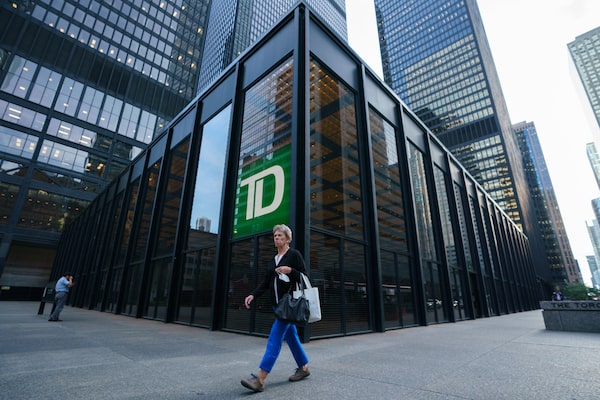
A person walks past a TD Bank sign in the financial district in Toronto on Sept. 20, 2022.Alex Lupul/The Canadian Press
Toronto-Dominion Bank TD-T executives knew about an anti-money-laundering probe by the U.S. Department of Justice more than six months before the company publicly disclosed the investigation that derailed its acquisition of Tennessee-based First Horizon Bank FHN-N, according to a report from The Capitol Forum.
The Capitol Forum’s story citing anonymous sources was published late Monday as details also emerged about a legal case filed last year against a former TD employee in New Jersey charged with helping launder millions of dollars in illegal drug sales since early 2022.
TD’s share price tumbled 4.4 per cent Tuesday, posting steeper losses than the S&P/TSX Composite Banks Index’s 1.6-per-cent drop and the 1.1 per cent slump at the KBW Bank Index, which tracks major U.S. lenders. In part, the stock price also fell because Tuesday was TD’s ex-dividend date, when the stock trades without its next dividend payment.
Canada’s second largest lender announced the First Horizon acquisition in February 2022. In November that same year, the TD’s executives were aware that multiple federal law enforcement agencies had found failures in the anti-money-laundering processes so significant that the deal was at risk of being rejected by U.S. regulators, according to the Capitol Forum report.
Since TD’s acquisition of First Horizon Corp. was terminated in May, investors have been waiting for details on the regulatory issues that scuttled the transaction. In August, TD disclosed in its third-quarter earnings results that it expected fines or other penalties stemming from probes by regulators and law-enforcement agencies, including the Department of Justice, related to its anti-money-laundering practices.
The bank also faces a lawsuit from certain First Horizon shareholders, accusing TD’s executives of making misleading statements and omissions about the deal.
“TD has rigorous processes in place to ensure disclosure of information consistent with our disclosure and contractual obligations,” TD spokesperson Lisa Hodgins said in an e-mailed statement. “Our public statements updated the market as matters evolved. At all times, TD acts in the best interests of the bank and our shareholders.”
In the Department of Justice case, former branch employee Oscar Marcelo Nunez-Flores was charged in October with allegedly helping create shell companies and issuing dozens of debit cards, allowing individuals in Colombia to withdraw laundered money.
Investigators allege in a court filing that Mr. Nunez accepted bribes to give people online access to the accounts, along with dozens of debit cards that were used to withdraw cash from ATMs in Colombia. He allegedly received thousands of dollars in bribes for each account he opened. The probe found that millions of dollars were laundered to Colombia through accounts opened by Mr. Nunez since early 2022.
“As alleged, Nunez corruptly exploited his position inside a bank to help launder millions of dollars in drug money in exchange for bribes,” U.S. Attorney Philip R. Sellinger said in a statement in October. “Today’s arrest shows that my office will expose and prosecute those who abuse positions of trust and seek to corrupt our financial institutions.”
The allegations against Mr. Nunez haven’t been proven in court. It is not known whether the case is related to the anti-money-laundering investigation disclosed in August.
“In respect of the recent charges of a TD branch employee in New Jersey, TD is cooperating fully with the law enforcement and this employee has been terminated,” Ms. Hodgins said.
The U.S. Internal Revenue Service (IRS) was also involved in the investigation.
“IRS Criminal Investigation and our law enforcement partners will continue to work together to hold accountable and disrupt bad actors like the defendant, who allegedly accepted bribes to facilitate millions of dollars of money laundering,” IRS Criminal Investigation special agent Tammy Tomlins said in a statement in October. “We are committed to protecting the integrity of our financial institutions by investigating and prosecuting individuals involved in financial crimes.”
In relation to the undisclosed anti-money-laundering issues related to the U.S. Department of Justice investigation, analyst have estimated that the penalty could range between US$500-million and US$1-billion.
Depending on the severity of the infractions, fines could far exceed those estimates. In 2012, HSBC paid about US$2-billion to settle charges connected to illegal drug money laundering.